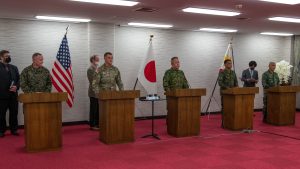On April 11, U.S. President Joe Biden will host the inaugural Japan-Philippines-U.S. trilateral summit at the White House. In this engagement, Biden, Japanese Prime Minister Kishida Fumio, and Philippine President Ferdinand R. Marcos Jr. will “advance a trilateral partnership built on deep historical ties… and a shared vision for a free and open Indo-Pacific,” according to the White House.
The historic meeting comes after a number of incidents in the South China Sea, where China Coast Guard vessels have used water cannons to harass Philippine vessels conducting rotation and resupply missions in Second Thomas Shoal, as well as other forms of coercion in the area. From a broader perspective, the trilateral meeting is driven by concerns over China’s more aggressive behavior in the region’s maritime domain. Cognizant of great power competition and China’s strategic intent to alter the balance of power in the Indo-Pacific, the United States and its allies seek to promote a rules-based order by advocating for a free and open Indo-Pacific.
The trilateral summit is anchored on the long-standing bilateral alliances of the U.S. with Japan and the Philippines. However, the road to the historic meeting has also been paved by the following building blocks in the security cooperation between and among the three countries.
While the United States has separate security treaties with Japan and the Philippines, the two U.S. allies have also cemented a strategic partnership. For much of the post-World War II era, the Japan-Philippines relationship has been dominated by economic cooperation and development assistance. While these remain key pillars of the relationship, shared security interests have driven the formation of strategic partnership, initially in 2009. Under the late Philippine President Benigno S. Aquino III, the strategic partnership became more security-oriented with the signing of a memorandum of understanding on defense cooperation, defense equipment and technology transfer agreement, support for coast guard capacity-building, among others.
The Japan-Philippines strategic partnership played a role in keeping the Philippines-U.S alliance intact during the incumbency of firebrand Philippine President Rodrigo R. Duterte, who sought to downgrade relations with the United States. Early in Duterte’s term, Tokyo convinced Manila to keep its alliance with Washington as a stabilizing force in the region. Although relations with the U.S. were rocky under Duterte, he nevertheless sought closer ties with Japan. Indeed, before Duterte left office, the strategic partners convened their first joint defense and foreign ministers’ meeting (2+2).
Another building block for the upcoming summit has been the enhancement of the Philippines-U.S. alliance. Over the past decade or so, Manila and Washington have achieved major strides in modernizing the alliance. Bilateral exercises, primarily Balikatan, have witnessed significant expansion. Indeed, more countries have participated in the exercises as observers. Japan, for example, has been an observer since 2012.
In 2014, Manila and Washington signed the Enhanced Defense Cooperation Agreement (EDCA), the implementation of which has accelerated under Marcos. The EDCA is a crucial agreement as tensions increase not just in the South China Sea but also in the Taiwan Strait. Moreover, Manila and Washington also signed new defense cooperation guidelines, which called for the “prioritiz[ation] of trilateral and other forms of multilateral cooperation based on common issues of shared concern and interest.”
Building on the Japan-Philippines strategic partnership and the Philippines-U.S. alliance, there have been initial efforts to advance trilateral cooperation. Indeed, officials from the three countries have met at the level of, among others, deputy assistant defense ministers, vice foreign ministers, national security advisers, and the 2+2 defense and foreign ministers. Their coast guards and militaries have held joint drills as well.
The upcoming summit will discuss a whole range of issues, including the promotion of inclusive economic growth and emerging technologies, advancing clean energy supply chains, and cooperation on climate change. Supporting the modernization of the Armed Forces of Philippines (AFP), Manila’s Comprehensive Archipelagic Defense Concept (CADC), and the overall South China Sea dispute will likely figure in the agenda. However, it is crucially important to talk about Taiwan, as well as to confront other forms of coercion and influence operations conducted by China in the three like-minded countries.
The Japan-Philippines-U.S. summit will be historic. There is presently a strong drive to move forward with trilateral cooperation. The challenge, however, will be sustaining the momentum after the conclusion of the summit.

































